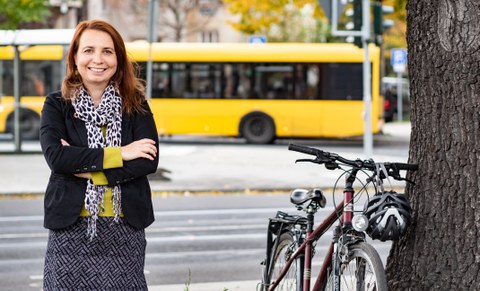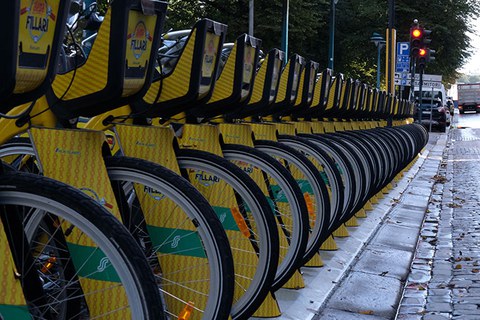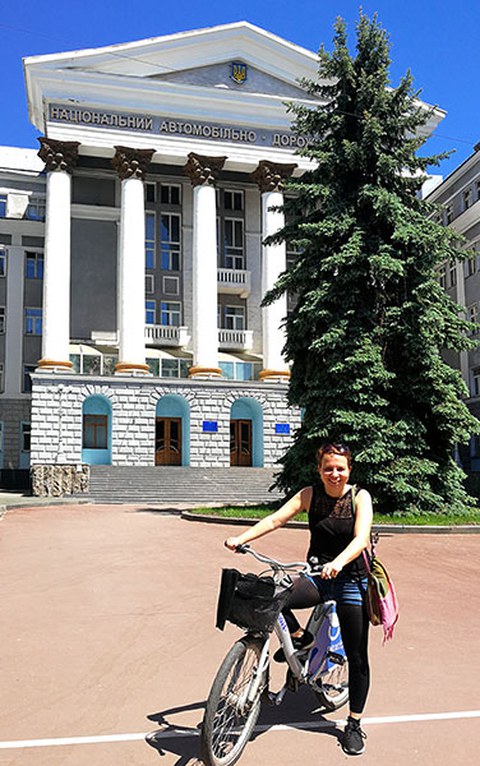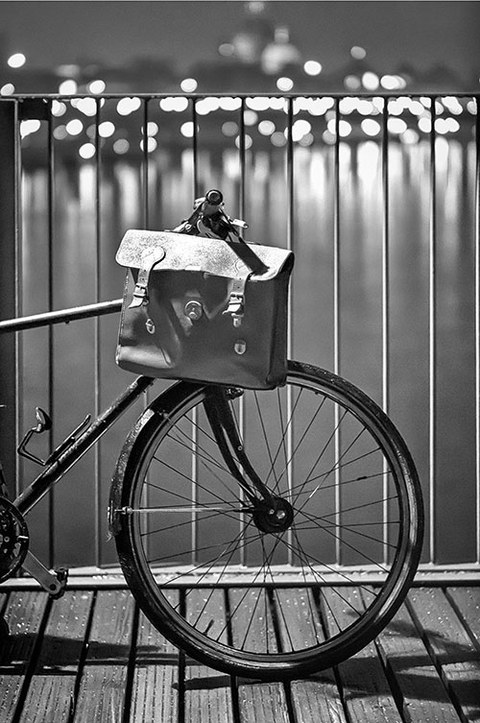A “child of the uni” with a love of research
(Profile from 2022)
Dagmar Möbius
Angela Francke started a degree in Transport Economics at TU Dresden in 1998 because she wanted to run her own hotel. During her first few semesters, her focus changed. Today, the 42-year-old from Dresden holds one of just seven chairs in cycling in all of Germany at the University of Kassel.

Prof. Angela Francke sees herself as a cyclist and more of a passenger when traveling by car.
No one had ever asked her when she got her first bicycle – despite the fact that she gives regular interviews and is in great demand as a mobility and cycling expert. “Sometime in elementary school” is her best guess. There was no indication she would choose her current specialization when she started her education.
Fascinated by the psychology of transport
“After graduating from high school, I spent a year in the UK. I was interested in running my own hotel there,” Angela Francke tells us. In 1998, she started a degree in transport economics in her home city, specializing in traffic and transportation psychology, tourism economics and management, logistics, and marketing. “However, I soon abandoned my original plan after an internship in a hotel during my Bachelor’s,” she laughs. She found transport services and logistics much more interesting, and was absolutely fascinated by traffic and transportation psychology. How does traffic planning influence people’s mobility behavior? Why do some people cycle on the sidewalk when there’s a bike lane marked on the road? Who travels where and how? Who is affected by the weather? Angela Francke has been exploring questions like these ever since she graduated in 2004. Environmental and climate protection is her main motivator.

Bicycles are a sustainable mode of transportation. We want to promote change and offer an infrastructure that is appealing to everyone, says Prof. Angela Francke.
Four types of cyclists
Francke continued her research at TU Dresden’s Chair of Traffic and Transportation Psychology – on year-round cycling, on infrastructural solutions to promote sustainable mobility, and on mobility behavior during the coronavirus pandemic. She and her colleagues have also created a typology of German cyclists in a study involving 10,000 participants, and identified four types: ambitious, functional, pragmatic, and passionate. These classifications are not just nice to have for academic journals; the context is important. “Bicycles are an environmentally friendly form of transportation. We want and need to make changes to our mobility behavior and provide an infrastructure that appeals to all groups, including beginners. It is important to me that we think globally,” says the transport and traffic science specialist.
For four years, she received research funding from the Heinrich Böll Foundation. In 2019, she defended her dissertation – an “Analysis of differentiated pricing systems in urban transport – requirements for user-friendly design to promote environmentally friendly mobility behavior.” Her supervisors were Professor Bernhard Schlag and Professor Udo Becker. Amongst other honors for her work, she was awarded the 2020 Karl Vossloh Innovation Prize for the best doctorate in mobility research. “I am a child of TU Dresden who loves research,” she says.
Global research and what Germany can learn

She conducted one of her research projects in Ukraine.
The list of her research endeavors is long. Here are just some examples: In Ukraine, she initiated an Erasmus partnership aimed at sharing and learning together. In a project with refugees from Syria, Russia and Turkey, she investigated what people’s mobility needs and attitudes. “People in Germany don’t necessarily need a car,” says Angela Francke, who describes herself as “more of a cyclist and usually a car passenger.” Part of the focus was on participation in society and increasing how far people can travel.
In East Africa, specifically in Ethiopia, Uganda, and Nairobi, the focus is on opportunities for local stakeholders to work together to promote cycling and traveling on foot. “In terms of digitalization, we can learn a lot from these countries,” she tells us. In addition to her position at the Chair of Traffic and Transportation Psychology, she also served as Coordinator at TU Dresden’s Center for International Postgraduate Studies of Environmental Management (CIPSEM). There, she was responsible for both international climate protection scholarship programs and promoted continuing education in sustainable mobility for developing countries as part of the UNEP/UNESCO/BMU Postgraduate Training Program.
A change of perspective and a major decision
In March 2021, Angela Francke was appointed to the Chair of Cycling at Karlsruhe University of Applied Sciences. In October 2021, she moved to a chair at the University of Kassel, where she heads the Cycling and Sustainable Mobility department, a newly established endowed chair funded by the German Ministry of Transport.

In Dresden, she only needed 12 minutes by bike to get from her home to her desk at work.
She talks enthusiastically about setting up the department. “I recruit staff, and it’s great to be able to set my own priorities and try out different ways of teaching.” For example, guides for municipalities are something she wants to put back on the curriculum. Why? “For many years, cars remained the focus.” Yet Professor Angela Francke is not a vehement opponent of cars. Quite the opposite. For as she says, “it is important to be familiar with all modes of transport, but also to enable everyone access to more environmentally friendly, safer mobility.” Still, she adds, the goal is to reduce individual motorized traffic worldwide. “We need environmentally friendly alternatives that are safe and comfortable, and consider together all modes of transportation,” she tells us.
Increased public interest
Professor Angela Francke receives numerous inquiries from the public and the media every day. And that’s a good thing, she says. “Bicycles offer many benefits. On average, each household has at least one. Most of the time, you can get going quickly, it doesn’t take up much space and you can estimate pretty well how long you’re going to need.” In Dresden, it took her twelve minutes to bike from home to her office. “It was and often is not only faster than other modes of transportation, it’s also healthier, keeps you in shape, and is a good opportunity to switch off for a bit.”
A network and opportunities for alumni
The experts in her field form a “supportive network in Germany.” Among other things, they run a joint doctoral seminar and conduct research together. She still has close ties with TU Dresden. November 2021, for example, saw the launch of a joint mFUND research project on key elements of the mobility transformation, MOTUS. She welcomes applications from alumni of the “Friedrich List” Faculty of Transport and Traffic Sciences. “I can offer transport engineers in particular a good basis for further training and research into this exciting and highly relevant current field.”
Contact:
Prof. Angela Francke
Fachgebiet für Radverkehr und Nahmobilität / Cycling and Sustainable Mobility
Universität Kassel
Mönchebergstraße 7
34125 Kassel
Tel: +49 (0)561 804-7703
Email
Website
